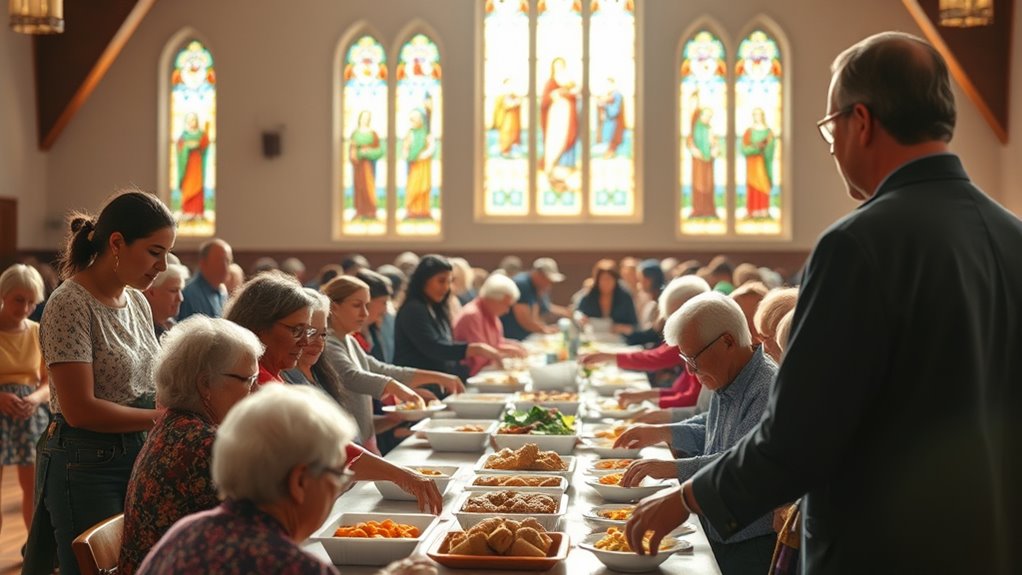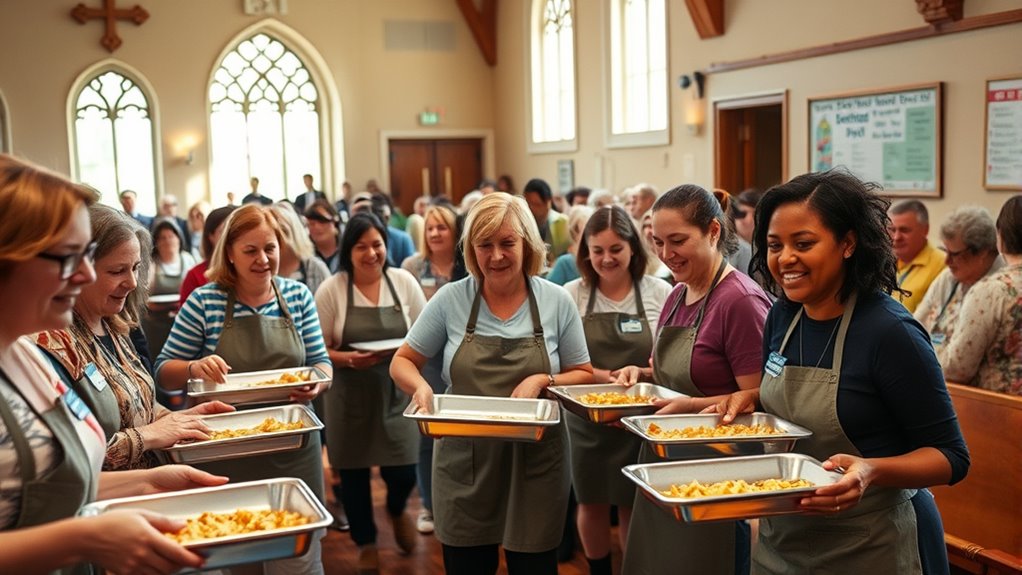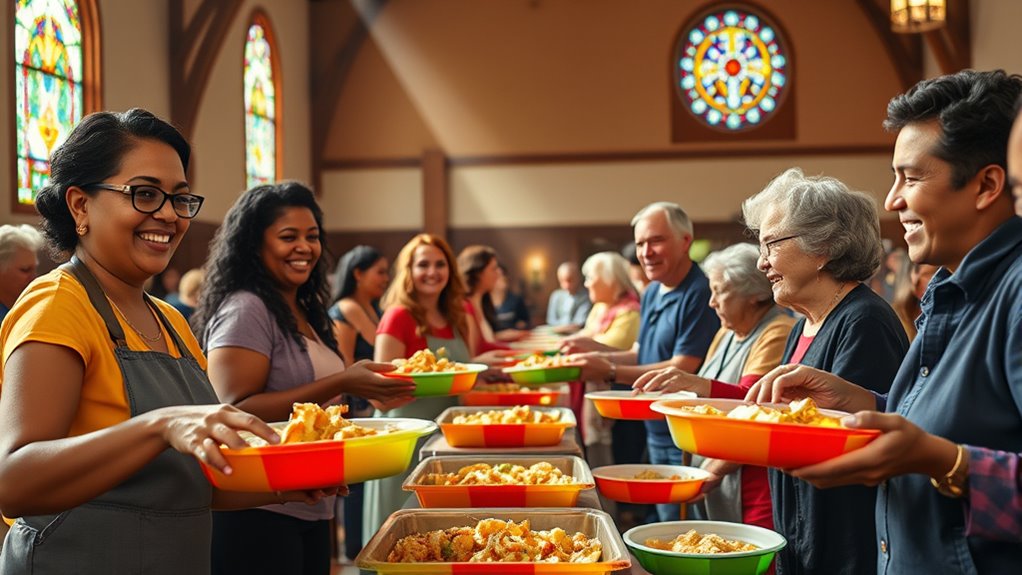Serving in the church starts with discovering your unique gifts and passions, then applying them with sincerity and compassion to help others. You can get involved in various ministries, develop your skills through practice and mentorship, and show genuine care in personal connections. Overcoming challenges with support and a heart of service allows you to reflect God’s love effectively. Keep exploring these ways, and you’ll uncover meaningful opportunities to make a lasting difference through your service.
Key Takeaways
- Identify your passions and talents through reflection, assessments, and feedback to discover how you can best serve others.
- Serve with genuine care and compassion, creating welcoming environments that foster heartfelt connections.
- Volunteer in various church ministries and leadership roles to utilize and develop your gifts effectively.
- Build strong relationships through active listening, empathy, and shared experiences to support and uplift others.
- Continuously enhance your skills through training, mentorship, and innovative approaches to serve with love and excellence.
Discovering Your Spiritual Gifts

Have you ever wondered what unique talents God has given you to serve others? The first step is identifying your passions—what excites you and makes you enthusiastic to help. Recognizing talents involves paying attention to the skills you naturally excel at or enjoy using. Think about activities where you feel most fulfilled or where others often seek your advice. These clues reveal your spiritual gifts, which are specific ways God has equipped you to serve His church. Reflect on moments when you felt God’s presence guiding you or when you received positive feedback from others. By actively recognizing your talents and passions, you can better understand how God is calling you to contribute meaningfully in the church community. Additionally, understanding your personality traits through assessments like the 16PF or MBTI can provide deeper insights into how you naturally relate to others and serve effectively. Engaging in self-awareness can further enhance your ability to identify your strengths and areas for growth, helping you serve with greater confidence and purpose. Recognizing the benefits of spiritual gifts can motivate you to discover new ways to serve and grow in faith. Furthermore, exploring specific service opportunities aligned with your gifts can help you find meaningful ways to contribute. Moreover, incorporating music therapy or sound healing practices can open new avenues for serving others through creative and holistic approaches to healing and encouragement.
The Importance of Serving With Heart

Serving with heart means genuinely caring about the people you’re helping and approaching your tasks with sincerity and compassion. Your heart motivation drives you to put others’ needs above your own, making your service authentic and impactful. When you serve with genuine compassion, you create a welcoming environment where others feel valued and understood. This sincerity shines through your actions, inspiring trust and fostering meaningful connections. Remember, it’s not just about completing a duty but about truly making a difference in someone’s life. Serving with heart transforms simple acts into powerful expressions of love and kindness. Your heartfelt service reflects Christ’s love, encouraging others and strengthening your own faith journey. Additionally, understanding the importance of self-watering plant pots can remind us to nurture others thoughtfully and sustainably. Recognizing the benefits of candles can also create a warm and comforting atmosphere that supports healing and fellowship. Embracing energy-efficient systems, such as heat pumps, can serve as a reminder of the value of sustainable and thoughtful service that benefits both people and the environment. Practicing mindful service helps us stay present and attentive to the needs of others, fostering empathy and compassion in our actions. Ultimately, it’s this genuine compassion that leaves a lasting, positive impact.
Ways to Get Involved in Church Ministries

Getting involved in church ministries offers a meaningful way to serve with heart and deepen your connection to the community. Start by exploring various volunteering opportunities, such as greeting visitors, leading small groups, or assisting with outreach programs. These roles allow you to share your gifts and make a tangible impact. Additionally, participating in leadership development programs can prepare you for more responsibilities, helping you grow personally and spiritually. Many churches offer training sessions or mentorship opportunities that foster your skills and confidence. By taking initiative and volunteering in different areas, you not only serve others but also discover where your strengths can be best utilized. Engaging actively in church ministries creates a fulfilling experience, strengthening your faith and fostering lasting relationships. Incorporating personal growth and self-discovery through these activities can further enrich your spiritual journey. Moreover, understanding emotional support concepts can help you better relate to others’ needs and provide meaningful encouragement within your ministry roles.
Developing Your Skills and Talents for Service

To effectively contribute to your church community, cultivating your skills and talents for service is vital. Begin with a talent assessment to identify your natural abilities and areas for growth. Reflect on what excites you and where you can make the most impact. Once you’ve assessed your talents, focus on skill enhancement through training, practice, or mentorship. Seek opportunities to learn new techniques or deepen your understanding of your current gifts. Developing your skills not only increases your confidence but also allows you to serve more effectively. Remember, growth is a continuous process—regularly evaluate your progress and look for ways to refine your abilities. Engaging with generative AI tools can also offer personalized suggestions for skill development and creative ideas. Prioritize nutrient-rich practices to maximize your learning and growth. Incorporating insights from scientific skepticism can help you approach your development with a balanced perspective. Staying informed about international finance trends can also inspire innovative ways to serve your community. By intentionally developing your talents, you’ll be better equipped to serve others with love and excellence in service.
Serving Through Acts of Compassion and Outreach

Acts of compassion and outreach allow you to embody Christ’s love in tangible ways that make a real difference in your community. You can do this through charitable giving, providing resources or support to those in need. It’s also essential to practice compassionate listening—truly hearing others’ stories and understanding their struggles. When you combine generous giving with a willingness to listen, you create meaningful connections that demonstrate God’s love in action. These acts can be simple, like volunteering at a local shelter or offering encouragement to someone hurting. By intentionally engaging in outreach, you show others they’re valued and loved by Christ. Incorporating the practice of spiritual growth can deepen your understanding of how to serve others more effectively. Developing a retirement planning mindset can help you sustain your service efforts over the long term, ensuring that your giving is consistent and impactful. Engaging in self-care practices is also vital to maintain your passion and energy for service, preventing burnout and fostering sustained compassion. Building community through multimedia engagement can enhance how you connect and share Christ’s love with others, expanding the reach of your service efforts. Additionally, understanding the importance of best restaurants can encourage fellowship and community-building during shared meals, making your outreach more inviting. Your efforts not only uplift individuals but also reflect the heart of service that Jesus models for all of us.
Building Community and Fellowship in Service

Building community through service helps you form meaningful connections with others in the church. When you participate in group activities, you strengthen bonds and create a sense of belonging. Cultivating mutual support encourages everyone to grow together and stay committed to serving. Engaging in group activities can also mirror strategies used in managing Bitcoin IRAs, such as diversification and regular monitoring, to enhance overall growth and stability. Additionally, honoring legacy and memories within the community reinforces the importance of shared history and collective support, fostering a more resilient fellowship. Recognizing the effectiveness of hydrocolloid patches in skincare can remind us of the importance of nurturing and caring for each other’s well-being, both physically and spiritually. Choosing names that reflect a person’s heritage can also deepen the sense of identity and unity within the community.
Fostering Personal Connections
Fostering personal connections is essential for creating a strong sense of community and fellowship within your service. When you share personal stories, you open doors for others to feel understood and valued. Active listening shows you genuinely care, strengthening bonds and building trust. Consider this approach:
| Sharing Personal Stories | Active Listening | Building Trust |
|---|---|---|
| Share your experiences | Pay full attention | Follow through on commitments |
| Encourage others to share | Show empathy | Be authentic and honest |
| Create a safe space | Ask thoughtful questions | Support each other |
Engaging in these practices helps cultivate genuine relationships, making your service more impactful and heartfelt. Personal connections deepen your community, inspiring others to serve with passion and unity.
Encouraging Group Activities
Encouraging group activities can strengthen the bonds formed through personal connections by providing opportunities for members to come together in shared experiences. When you organize events like community service projects, prayer groups, or fellowship dinners, you create spaces for meaningful group bonding. These activities foster a sense of belonging and trust, making everyone feel more connected to the church community. Plus, they promote spiritual growth as members learn from each other’s insights and support one another’s faith journeys. By actively encouraging participation, you help build a vibrant, unified church where members feel motivated to serve and uplift one another. Ultimately, group activities serve as a powerful tool to deepen relationships and nurture a stronger, more spiritually connected congregation.
Cultivating Mutual Support
How can you create a supportive church environment that nurtures genuine fellowship through service? Start by fostering peer encouragement, where members uplift one another through shared responsibility. When everyone contributes, a sense of belonging grows stronger. Encourage open communication and active participation to build trust and connection. You can also organize small groups or prayer partnerships, strengthening bonds through shared efforts. Here’s an example:
| Peer Encouragement | Shared Responsibility | Building Community |
|---|---|---|
| Celebrate successes | Divide tasks evenly | Create support networks |
| Offer words of affirmation | Rotate leadership roles | Foster accountability |
| Share personal stories | Collaborate on projects | Promote inclusiveness |
This approach nurtures mutual support, turning service into a means of deepening fellowship.
Overcoming Challenges in Volunteering

Volunteering in the church can present challenges, but overcoming them is essential to serving effectively. One common obstacle is balancing commitments. It’s easy to feel overwhelmed when juggling work, family, and church responsibilities. To stay on track, prioritize your tasks and set realistic boundaries. Managing burnout is another significant challenge; giving too much without rest can lead to fatigue and frustration. Make sure to schedule regular breaks and seek support when needed. Communicate openly with church leaders about your limits, and don’t hesitate to ask for help. Remember, serving is a marathon, not a sprint. By maintaining a healthy balance and recognizing signs of burnout, you can sustain your passion and make a lasting impact in your church community.
Reflecting God’s Love Through Your Service

Reflecting God’s love through your service means letting your actions mirror His compassion, patience, and kindness. When you serve others, you demonstrate His love in tangible ways. Healing through prayer is a powerful tool; it shows others that God cares deeply about their struggles and hopes. By praying with and for those you serve, you help facilitate spiritual healing and comfort. Sharing testimonies of God’s work in your life also reveals His love and power, inspiring others to trust Him more. Your genuine acts of service, rooted in love, become a reflection of God’s character. Through kindness, encouragement, and prayer, you become a living testimony of God’s love, drawing others closer to Him and spreading His grace in practical ways.
Frequently Asked Questions
How Can I Identify My Unique Spiritual Gifts Effectively?
To identify your unique spiritual gifts, start with gift discovery by reflecting on what energizes and motivates you. Pay attention to moments of spiritual awareness where you feel a sense of purpose or fulfillment. Ask trusted friends or mentors for feedback, and pray for guidance. Keep an open mind and try different activities to see where your strengths and passions lie, helping you better understand your divine gifts.
What Are Practical Ways to Sustain Long-Term Service Commitments?
Imagine a steady stream that never runs dry—your long-term service relies on similar persistence. To sustain it, you need smart time management, carving out regular slots for your commitments. Building relationships with fellow volunteers creates a support system, keeping you motivated and connected. Stay flexible, celebrate small victories, and remind yourself of your purpose. This way, your dedication flows smoothly, fueling your passion and ensuring lasting impact.
How Do I Balance Serving Others With Personal Life Responsibilities?
Balancing serving others with your personal life requires good time management and boundary setting. You need to prioritize your responsibilities and allocate specific times for service without overextending yourself. Set clear boundaries to protect your personal time, so you stay energized and focused. Regularly evaluate your commitments, and don’t hesitate to adjust as needed, ensuring you serve effectively while still caring for your own well-being.
What Should I Do if I Feel Unqualified to Serve?
If you feel unqualified to serve, it’s common to experience self-doubt. To overcome this, focus on building confidence by recognizing your unique strengths and seeking guidance or training when needed. Remember, everyone starts somewhere, and your willingness to help matters more than perfection. Trust in your abilities, ask for support, and take small steps. Your genuine effort can make a meaningful difference, even if you initially feel unsure.
How Can I Encourage Others to Get Involved in Ministry?
Imagine you’re lighting a candle in a dark room—your enthusiasm can ignite others’ spirits. To motivate volunteers, share heartfelt testimonies that reveal the impact of service. Highlight how their gifts can brighten lives and bring hope. Encourage them by showing how their unique talents matter. When you lead by example and celebrate small wins, you inspire others to step forward, knowing their contributions truly make a difference in God’s work.
Conclusion
By using your gifts to serve, you become a beacon of God’s love, shining brightly in your community. Just like a lighthouse guides ships safely home, your acts of kindness and service can lead others closer to Christ. Embrace every opportunity to help, grow, and connect with others through your unique talents. Remember, serving in the church isn’t just an act — it’s a way to reflect God’s love and make a lasting impact.










